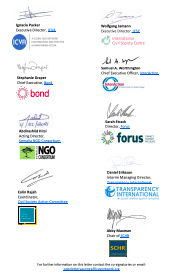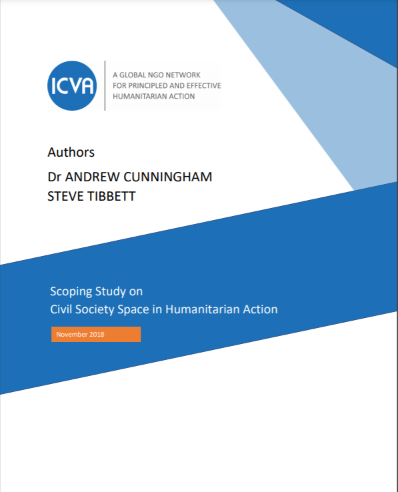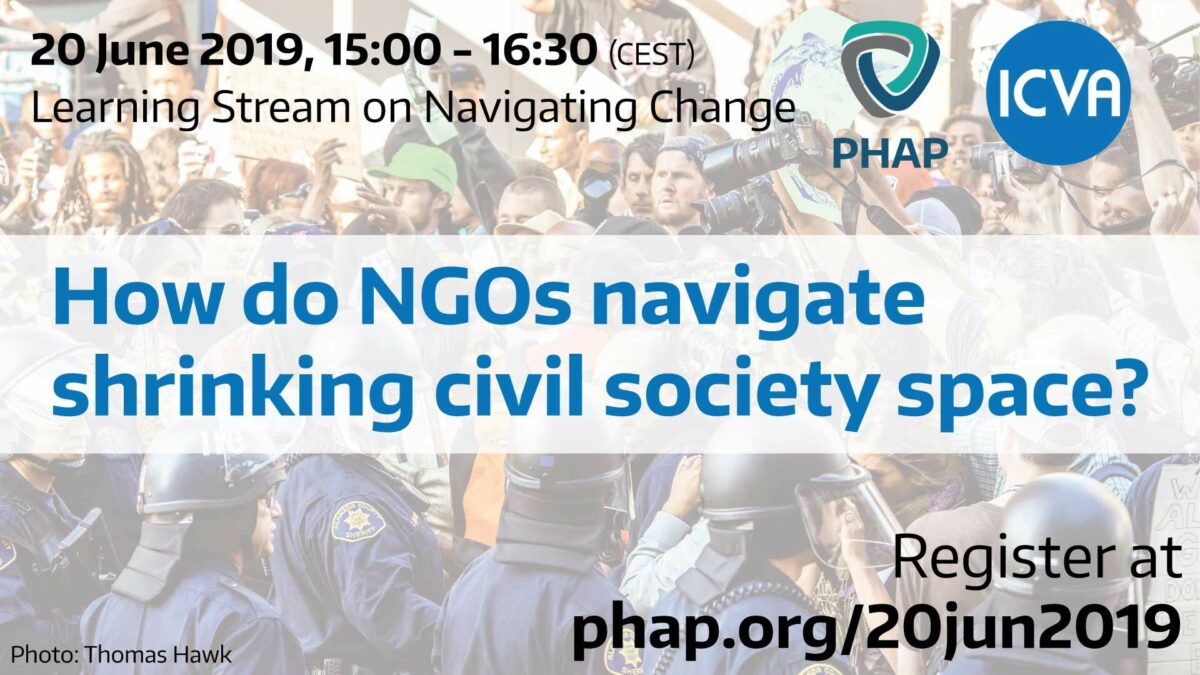-
Search -
Accessibility -
Members Login
Our work
ICVA is a champion of principled humanitarian action, advocating for the respect and protection of humanitarian space and supporting the effective, appropriate translation of principles into practice.
Humanitarian principles were created recognising the imperative for space to respond to civilian needs in times of conflict in a human, impartial, neutral, and independent manner. The rationale for their creation remains a powerful argument to demand continued respect for humanitarian action that is both distinct from and complementary to civil society ambitions for peace and development. ICVA will continue to be an advocate to protect and ensure respect for principled humanitarian action. We will drive and advocate the value of NGO influence to shape humanitarian space.
ICVA’s mission is to make humanitarian response more principled and effective. Our members believe that a rights-based approach, and operations and advocacy based on core humanitarian principles, will benefit people affected by disasters, conflict, and crises. Humanitarian Principles are therefore, fundamental to ICVA’s work with NGOs and other humanitarian stakeholders. ICVA advocates this perspective when dealing with various stakeholders including the UN Security Council, member states and NGOs.
The core humanitarian principles of humanity, impartiality, neutrality and operational independence provide the foundations for humanitarian action. The principles are rooted in the Geneva Conventions and endorsed by the UN General Assembly as guidelines for the UN Office for the Coordination of Humanitarian Affairs (UNOCHA) and the many non-governmental organisations (NGOs) delivering humanitarian assistance.
Here is what each principle entails:
Humanity: Human suffering must be addressed wherever it is found. The purpose of humanitarian action is to protect life and health and ensure respect for human beings.
Neutrality: Humanitarian actors must not take sides in hostilities or engage in controversies of a political, racial, religious or ideological nature.
Impartiality: Humanitarian action must be carried out on the basis of need alone, giving priority to the most urgent cases of distress and making no distinctions on the basis of nationality, race, gender, religious belief, class or political opinions
Independence: Humanitarian action must be autonomous from the political, economic, military or other objectives that any actor may hold with regard to areas where humanitarian action is being implemented.
Commitment to these principles has also been expressed in the Code of Conduct for the International Red Cross and Red Crescent Movement, and non-governmental organisations in disaster relief, and in the Humanitarian Charter and Minimum Standards in Humanitarian Response of the Sphere Project.
ICVA works with NGOs and other humanitarian stakeholders to promote an active dialogue on humanitarian principles and help NGOs understand their application during crises and humanitarian response.
Humanitarian actors, with the lead of the International Federation of Red Cross and Red Crescent Societies (IFRC), have been developing what is called International Disaster Response Law (IDRL) deriving from principles in International Humanitarian Law (IHL) and customary law principles. It aims at clarifying responsibilities and facilitated cooperation in situations of natural disasters. IDRL Guidelines are recommendations to governments on how to best structure their domestic laws relating to disaster management, and include guidance on coordination among organisations and governments, free passage of essential items and medical personel, and legal recognition of humanitarian organisations to operate. They are not legally binding, but serve to promote uniform legislation throughout countries to improve the response to natural disasters and facilitate fast and efficient recovery to an affected population.
ICVA regards this initiative as an important complementary component to IHL and has been involved in its development and promotion, including through co-hosting the International Dialogue on Strengthening Partnership in Disaster Response.
The unwarranted use of legal tools, misuse of power and politicisation of humanitarian aid by some governments and authorities has gradually and in some cases dramatically impacted civic space and the space for humanitarian action. It has also reduced the civic space in which people and NGOs can operate, including laws criminalising access to foreign funding and unduly limiting the scope of their permissible activities. Trends in nationalism have also been used as a rationale for limiting civic freedom. ICVA, our Secretariat and members, along with other civil society actors, will work strategically and collaboratively, advocating jointly to ensure an enabling environment for agile humanitarian response and in turn to promote civic space more generally.
For more information on civil society space or to join the civil society space working group, contact:

Issie is an advocacy and communications specialist with a focus on ensuring documented policy outcomes for the protection of displaced populations globally. Joining ICVA in November 2024, Issie brings over eight years’ experience engaging diverse stakeholders, across crises and contexts, for the promotion of International Humanitarian Law, principled humanitarian access, and civilian protection from violence. Prior to ICVA, Issie was leading Action Against Hunger’s advocacy and communications in the occupied Palestinian territory.
As part of ICVAs Forced Migration team, Issie supports members in their work to ensure people are protected, and can access timely, quality and sustainable assistance and solutions.
Issie holds a master’s degree from the London School of Economics and Political Sciences in International Development and Humanitarian Emergencies.

NGO Open Letter calling on States to step up multilateral efforts and lead a truly global response. It is in our common interest to ensure that priority in access to vaccine at a global level is given to those at a higher risk of infection and/or developing serious disease. Other priority considerations at national and global level will be counterproductive, leading to a perpetual spiral of new, vaccine-resistant variants of the virus.

The scoping study on civil society space in humanitarian action
Civil society space is increasingly a key issue for humanitarian organisations. It was the theme of the 2017 ICVA annual conference, and since then there are a growing number of crises where civil society actors have been denied access to a population in need. As a network, ICVA is grappling with the issues of erosion of humanitarian space, negative perceptions of civil society action by governments, and uncertain regulatory environments.
Civil Society organisations are operating in an increasingly restricted space, but this is also true for those working in Humanitarian Action. They face restrictions that limit freedoms of assembly and association. This webinar discusses what these limitations look like as well as highlighting ways that
humanitarian agencies can better engage with audiences while navigating them.
The webinar features a panel discussion with experts to provide insight on the current state of civil society and how humanitarian NGOs can improve their engagement.

This webinar is part of the “Navigating Change” Learning Stream which includes webinars, briefing papers, and other resources on how NGOs are managing changing global, regional, and national contexts for humanitarian response.

ICVA is a global network of non-governmental organisations whose mission is to make humanitarian action more principled and effective by working collectively and independently to influence policy and practice.
International Council of Voluntary Agencies
NGO Humanitarian Hub,
La Voie-Creuse 16, 1202, Geneva, Switzerland
Email: secretariat@icvanetwork.org
A curation of monthly updates, latest news, tools, and events around forced migration, coordination, financing, and cross cutting issues all sent straight to your inbox.